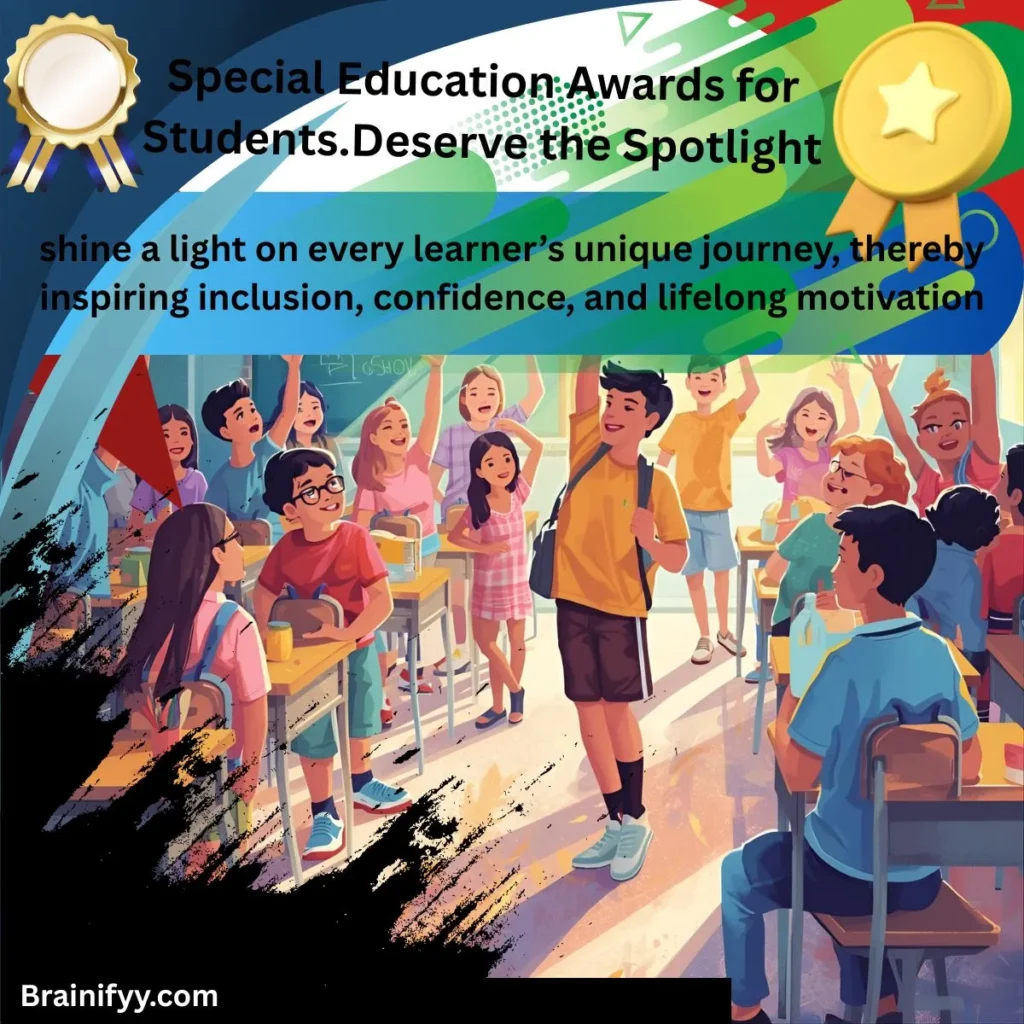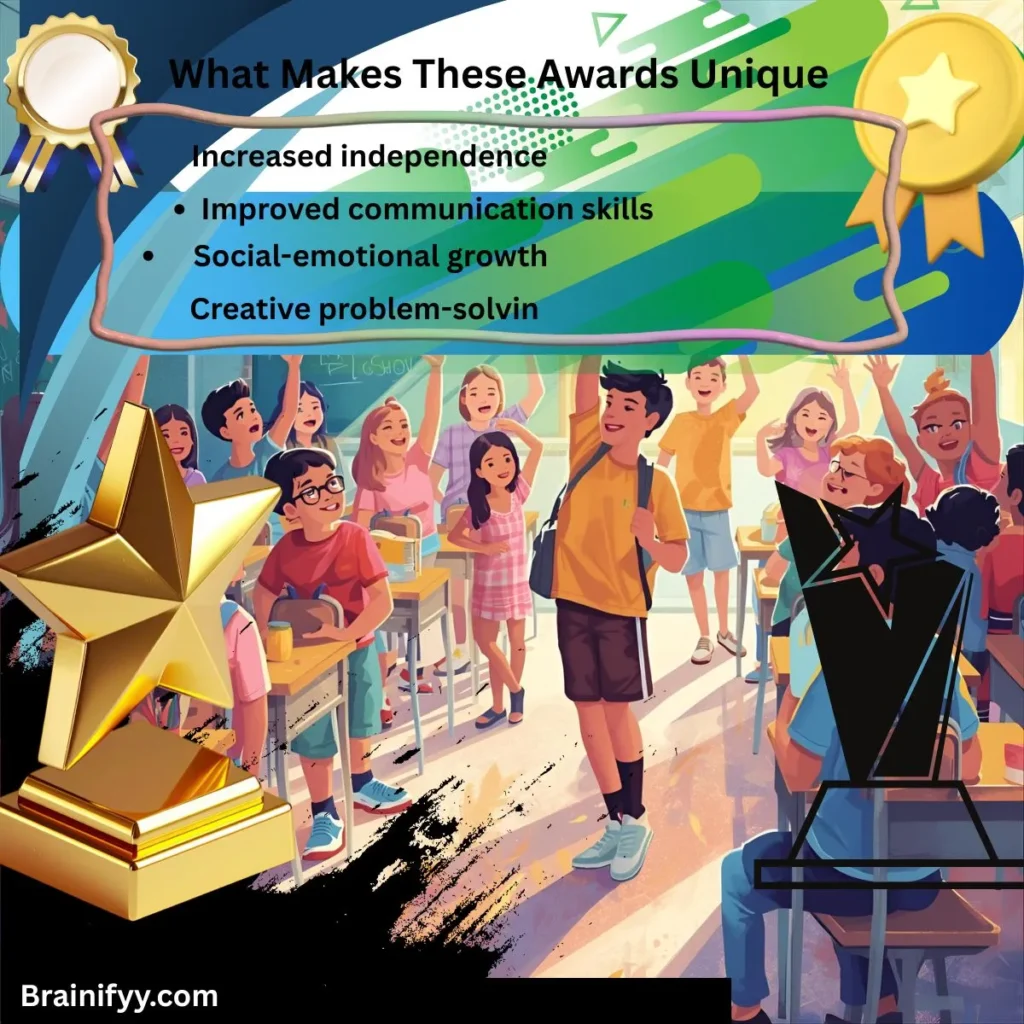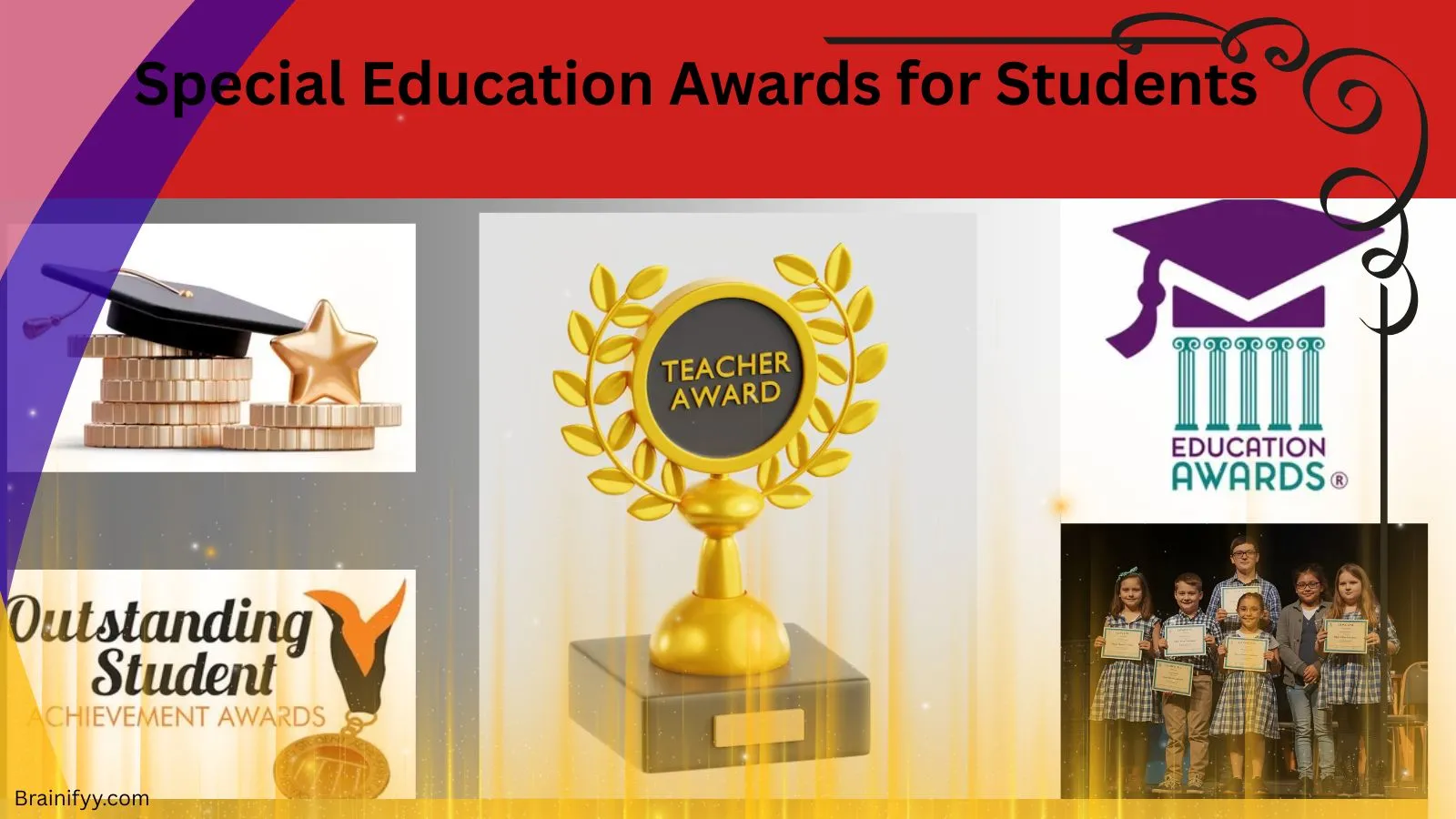Every student deserves recognition, especially those who work hard despite learning challenges. That’s why people search for special education awards for students — they want ways to honor effort, progress, and determination beyond grades. Many teachers and parents feel confused about how to celebrate these students fairly and meaningfully. Should awards focus on academics, behavior, or life skills?
This article solves that confusion. You’ll find a clear explanation of what special education awards for students mean, where the idea came from, how to use them properly, and which spelling or term is correct in different regions. We’ll also explore real examples, data from Google Trends, and common mistakes to avoid. Whether you’re a teacher in the US, UK, or anywhere in the world, this guide will help you choose the right words—and the right way—to recognize your students’ success.
Special Education Awards for Students.Deserve the Spotlight

Special Education Awards for Students deserve the spotlight because they celebrate determination, growth, and resilience—qualities that define true success beyond grades.
These awards, moreover, shine a light on every learner’s unique journey, thereby inspiring inclusion, confidence, and lifelong motivation.
In addition, special education awards for students go beyond traditional academic recognition. Instead of focusing only on grades, these awards celebrate personal growth, resilience, and individual milestones—qualities that often go unnoticed in mainstream award ceremonies.
For example, when students with learning differences or disabilities receive recognition, it can significantly boost self-esteem, motivation, and a genuine sense of belonging. Ultimately, these celebrations encourage every student to believe that progress, not perfection, defines true success.
What Makes These Awards Unique?

Unlike standard awards like “Honor Roll” or “Perfect Attendance,” special education awards are tailored to highlight:
- Social-emotional growth
- Improved communication skills
- Increased independence
- Creative problem-solving
- Peer support and kindness
These awards recognize the whole child, not just academic performance.
Creative Award Ideas for Special Education Students
| Award Name | What It Celebrates |
|---|---|
| Social Butterfly Award | Growth in social interaction and peer engagement |
| Fabulous Friend Award | Acts of kindness and empathy toward classmates |
| Independent Worker Award | Progress in completing tasks with minimal assistance |
| File Folder Master | Mastery of specific classroom routines or tools |
| Computer Champion | Tech skills and digital learning achievements |
| Perseverance Award | Overcoming challenges with determination and grit |
Sources:
When and How to Present These Awards
- End-of-Year Ceremonies:
- Celebrate progress and milestones before summer break.
- Monthly Recognition:
- Additionally, highlight ongoing achievements throughout the year to keep students motivated and engaged. This way, every effort feels valued, not just end-of-year accomplishments.
- Parent-Teacher Conferences:
- Moreover, share awards as part of student progress reports to celebrate milestones and demonstrate consistent growth. As a result, parents gain deeper insight into their child’s progress and confidence.
- Classroom Displays:
- Finally, create a “Wall of Fame” to showcase award recipients. In doing so, you promote inclusion, pride, and a supportive learning environment for all students.
Special Education Awards for Students – Quick Answer
Special education awards for students are honors given to learners with special needs to celebrate their progress, effort, and unique skills.
These awards highlight achievements such as:
- Overcoming personal challenges
- Consistent improvement in learning or behavior
- Showing kindness, teamwork, or creativity
For example:
🏆 “Most Determined Learner” or “Best Problem-Solver in Class” are common awards in special education programs.
These recognitions boost confidence and promote inclusion across classrooms.
The Origin of “Special Education Awards for Students”
The term special education began in the early 20th century when schools started to support students with learning or physical differences. Over time, teachers and administrators realized that traditional academic awards didn’t fit every child’s journey.
Thus, the phrase “special education awards for students” evolved to mean recognition that values growth, not just grades. The term gained popularity in the U.S. in the 1970s after special education laws like the Individuals with Disabilities Education Act (IDEA).
The spelling of “special education” has stayed the same across regions, but award names often differ slightly depending on local culture or values.
British English vs American English Spelling
While “special education” is spelled the same in both British and American English, certain award-related terms may vary. For instance, “programme” vs. “program,” or “behaviour” vs. “behavior.”
Here’s a comparison table:
| Term (UK) | Term (US) | Example Use |
|---|---|---|
| Programme | Program | Special Education Programme / Program |
| Behaviour Award | Behavior Award | Positive Behaviour Award / Behavior Award |
| Honour Certificate | Honor Certificate | Certificate of Honour / Honor Certificate |
In essence, the keyphrase special education awards for students remains universal, though award names differ slightly.
Which Spelling Should You Use?
If you’re writing for a US audience, use “program,” “behavior,” and “honor.”
For a UK or Commonwealth audience, prefer “programme,” “behaviour,” and “honour.”
For global readers, consistency matters more than spelling. Choose one version and stick to it throughout your writing or award templates.
Teachers creating online materials for international audiences often use the American version because it’s recognized globally.
Common Mistakes with “Special Education Awards for Students”
Here are frequent errors people make with this keyword:
| Mistake | Correction |
|---|---|
| special award for education students | ✅ special education awards for students |
| special needs student awards | ✅ special education awards for students |
| students special education awards | ✅ special education awards for students |
| awards special education student | ✅ special education awards for students |
Always keep the phrase in the exact order for SEO and clarity.
Special Education Awards for Students in Everyday Examples
You’ll see this phrase used in:
- 📧 Emails
- “As part of our ongoing commitment to student recognition, we’re preparing our special education awards for students this Friday. Furthermore, we encourage families to attend and celebrate every learner’s success.”
- 📰 School Newsletters
- “Therefore, we invite you to join us in celebrating our Special Education Awards for Students ceremony. In addition, this event highlights the courage and determination of all our students.”
- 📱 Social Media
- “So proud of all our learners who won special education awards this year—your achievements inspire us every day! Meanwhile, our staff continues to support each student’s unique learning journey.”
- 📝 Formal Writing
- “In recognition of exceptional progress and dedication, the district annually honors outstanding achievements through Special Education Awards for Students. As a result, this initiative strengthens inclusion and promotes equal opportunities for all learners.”
These examples show the phrase works naturally in both casual and formal contexts.
Special Education Awards for Students – Google Trends & Usage Data
According to Google Trends, searches for special education awards for students peak between April and June, as schools plan graduation and award ceremonies.
The highest search interest comes from:
- United States 🇺🇸
- Canada 🇨🇦
- United Kingdom 🇬🇧
- Australia 🇦🇺
This pattern shows educators worldwide seek ways to recognize progress in inclusive classrooms.
| Country | Search Interest | Common Context |
|---|---|---|
| United States | High | IDEA awards, school year-end events |
| UK | Medium | Inclusion awards, SEN programs |
| Canada | Medium | Classroom recognitions |
| Australia | Medium | Achievement certificates |
FAQs about Special Education Awards for Students
1. What are good examples of special education awards?
Awards like “Most Improved Reader,” “Kindness Champion,” or “Strongest Spirit” are popular. Additionally, teachers often create custom titles such as “Best Listener” or “Creative Thinker” to suit individual student strengths.
2. Why are special education awards important?
They encourage motivation, self-worth, and inclusion. Moreover, these awards help students feel valued and supported, which can lead to greater classroom participation and confidence.
3. Who can give special education awards?
Teachers, principals, or even peers can present them. In fact, involving classmates or parents makes the recognition more personal and meaningful.
4. Are there templates available?
Yes, many free templates exist on sites like Canva or Teachers Pay Teachers. Furthermore, schools can easily customize these templates to include student photos, logos, or positive affirmations.
5. Should all students get an award?
Ideally, yes—each student can be recognized for their unique strength. This way, no child feels left out, and every learner’s progress is celebrated.
6. How often should these awards be given?
Quarterly or yearly, depending on school policy. However, monthly recognition can keep students engaged and motivated throughout the academic year.
7. Can parents create their own special education awards?
Absolutely. Parents can design simple certificates to celebrate home-based learning goals. In addition, these small gestures strengthen family bonds and reinforce positive learning behavior at home.
Conclusion
Recognizing effort is one of the best ways to motivate learners. Special education awards for students go beyond academic marks—they celebrate courage, perseverance, and progress. Whether you’re a teacher, school leader, or parent, these awards remind every student that growth matters more than grades.
When writing about or designing awards, choose spelling that matches your audience, stay consistent, and use inclusive language. Over time, these recognitions build a culture of empathy and achievement for all students.


Leave a Reply